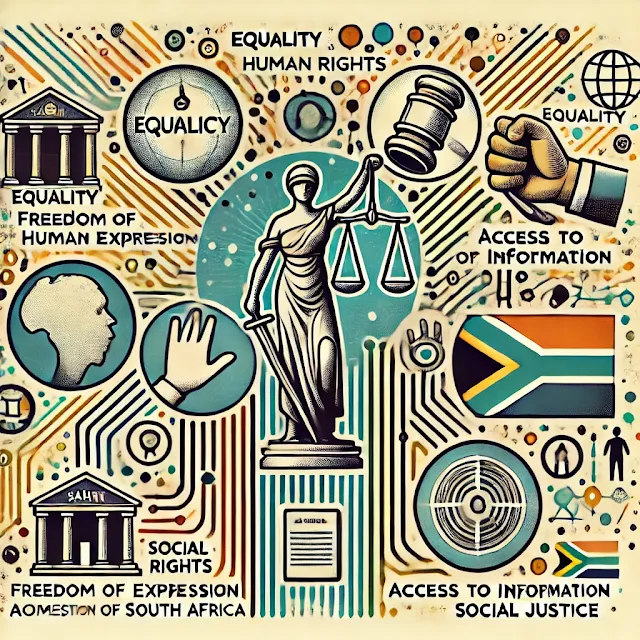The South African Human Rights Commission (SAHRC) is a constitutional body established to support constitutional democracy in South Africa. Its mandate is set out primarily in the Constitution of South Africa and the Human Rights Commission Act of 1994. The key aspects of the SAHRC’s mandate include:
1. Promotion of Human Rights
The SAHRC is responsible for promoting respect for human rights in the country. This includes raising public awareness about human rights through education campaigns, public outreach programs, and policy advice.
- The SAHRC runs public education campaigns to raise awareness about human rights and the Constitution. These campaigns target schools, communities, and organizations to inform people about their rights and responsibilities.
- The Commission organizes workshops, seminars, and public lectures on various human rights topics, such as equality, dignity, and socio-economic rights (e.g., access to water, healthcare, and education).
- It also works closely with non-governmental organizations (NGOs) and civil society to advocate for human rights.
2. Protection of Human Rights
The Commission ensures that human rights are protected and that everyone in South Africa can enjoy these rights without discrimination. This includes investigating violations and taking steps to rectify injustices.
- The SAHRC actively engages in human rights advocacy, pushing for legislative changes and improved implementation of policies that promote human rights.
- It can take action to stop violations by issuing recommendations, engaging with institutions, or pursuing legal remedies.
- The SAHRC’s work focuses on vulnerable groups, such as women, children, refugees, migrants, and people with disabilities, to ensure their rights are upheld.
3. Monitoring and Assessing Human Rights
The SAHRC monitors and assesses the observance of human rights across various sectors of society, including government institutions, private entities, and other organizations. It reports on these assessments to Parliament and the public.
- The Commission is responsible for the monitoring of public institutions, private entities, and government departments to ensure compliance with constitutional human rights standards.
- The SAHRC produces regular reports to Parliament, including reports on:
- Access to information and freedom of expression.
- Equality in all sectors of society.
- Water, sanitation, healthcare, and other essential socio-economic rights.
- The Commission also monitors compliance with international treaties and agreements to which South Africa is a signatory, including those related to human rights.
4. Investigating Complaints
The SAHRC has the power to investigate human rights violations. Individuals or groups who believe their rights have been infringed can lodge complaints with the Commission. It can conduct investigations, hold hearings, and take appropriate action to resolve issues.
- Any individual or group can lodge a complaint with the SAHRC if they believe their rights have been violated. Complaints can be submitted online, via mail, or in person.
- The Commission will investigate the complaint and, where appropriate, mediate between the parties to resolve disputes.
- If necessary, the SAHRC can refer cases to the Equality Courts or even initiate its own legal proceedings to ensure justice is served.
- The SAHRC handles cases involving discrimination, inequality, racism, xenophobia, and other human rights abuses.
5. Advising Government on Human Rights
The Commission advises the government on matters related to human rights and constitutional compliance. It makes recommendations to improve laws, policies, and practices in order to align them with human rights standards.
- The SAHRC advises government institutions on aligning their policies and practices with constitutional mandates.
- It gives recommendations on proposed laws and policies, especially those affecting human rights. For example, it may suggest improvements to legislation related to freedom of expression, children’s rights, or land reform.
- The SAHRC also engages with the government on issues of police brutality, detention conditions, and unlawful evictions.
6. Engaging in Research and Reporting
The SAHRC undertakes research into human rights issues and publishes reports, including its annual report to Parliament, on the state of human rights in South Africa.
- The Commission conducts in-depth research on human rights issues, such as:
- Gender-based violence.
- Access to justice for vulnerable groups.
- Environmental rights, especially for communities affected by mining and pollution.
- The SAHRC's research forms the basis of its annual reports to Parliament, where it provides an assessment of human rights developments and challenges in South Africa.
- These reports often include recommendations for policy changes, based on findings from investigations and consultations with stakeholders.
7. Litigation and Legal Intervention
The Commission has the authority to intervene in court cases or to initiate legal action in cases where human rights have been infringed.
- The SAHRC has the authority to intervene in court cases where human rights are at stake. This may involve joining a case as an amicus curiae (friend of the court) or bringing its own legal challenge.
- The Commission may pursue strategic litigation to address widespread human rights violations, aiming for landmark decisions that set a precedent for future cases.
- It also provides legal assistance to complainants in certain cases, especially where the individual or group lacks resources to seek justice.
Additional Functions:
- The SAHRC works with various international organizations, such as the United Nations, African Union, and other human rights bodies, to ensure that South Africa remains compliant with its international human rights obligations.
- It plays a critical role in monitoring the implementation of the Promotion of Access to Information Act (PAIA), ensuring that people have the right to access government-held information.
- The Commission is also tasked with ensuring equality and anti-discrimination, which includes handling cases of racism, sexism, and homophobia.
The SAHRC plays a key role in ensuring that South Africa's laws and policies comply with its Constitution and international human rights obligations.












0 Comments